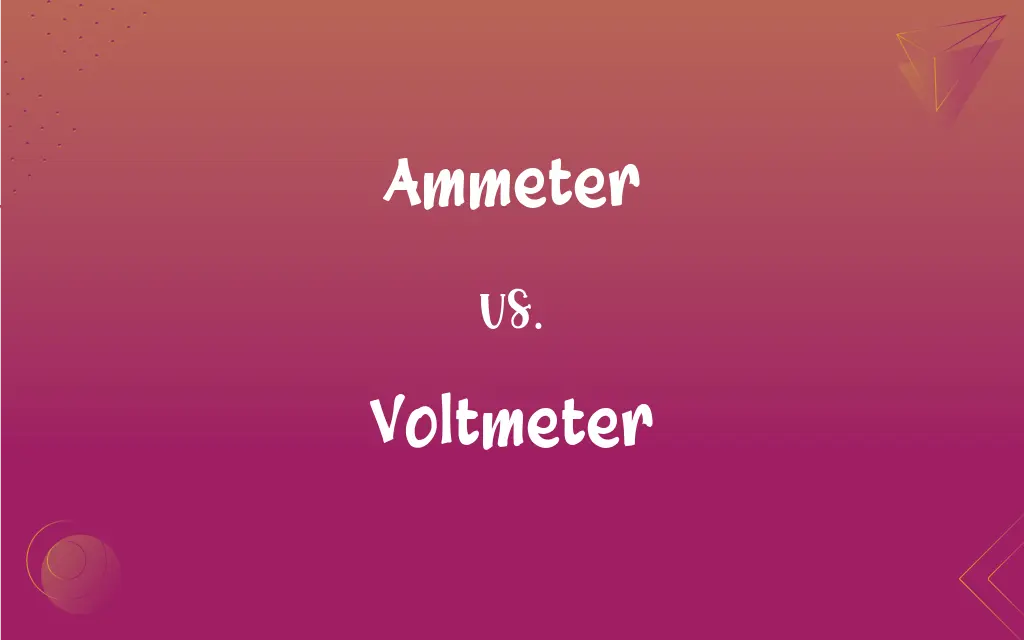Ammeter vs. Voltmeter: What's the Difference?
Edited by Aimie Carlson || By Janet White || Published on March 27, 2024
An ammeter measures electric current in a circuit, while a voltmeter measures the electric potential difference between two points in a circuit.

Key Differences
An ammeter is a device used to measure the current flowing through a circuit. It is connected in series with the circuit so that the electric current passes through the ammeter. A voltmeter, on the other hand, is used to measure the voltage (or potential difference) between two points in a circuit. It is connected in parallel with the portion of the circuit where the measurement is to be made.
The primary function of an ammeter is to gauge the flow of electric current, measured in amperes (A). It gives an insight into how much electric charge is passing through a point in the circuit per second. In contrast, a voltmeter measures voltage, indicating how much electric potential energy is available to move electrons from one point to another in the circuit, measured in volts (V).
Ammeters are designed to have very low resistance so that they do not significantly alter the amount of current flowing in the circuit. Voltmeters, however, have high resistance to ensure they do not draw a significant amount of current from the circuit, which could affect the voltage being measured.
The accuracy of an ammeter is critical in applications where precise current measurements are necessary, such as in power supply systems. Voltmeters are essential in applications where voltage levels need to be monitored for safety and efficiency, such as in electrical testing and troubleshooting.
Both ammeters and voltmeters are fundamental tools in electrical engineering and physics. Their use is vital in designing, testing, and maintaining electrical devices and systems. However, their functions and methods of connection to circuits are distinctly different, reflecting their different measurement objectives.
ADVERTISEMENT
Comparison Chart
Measurement
Electric current (amperes)
Electric potential difference (volts)
Circuit Connection
Connected in series
Connected in parallel
Internal Resistance
Very low resistance
Very high resistance
Usage
Measures how much charge passes through
Measures electric potential energy available
Applications
Power supply systems, electrical circuits
Electrical testing, troubleshooting
ADVERTISEMENT
Ammeter and Voltmeter Definitions
Ammeter
A tool with low resistance for current measurement.
The ammeter's low resistance ensured accurate current readings.
Voltmeter
An instrument for measuring electrical potential in volts.
He used a voltmeter to measure the voltage across the battery.
Ammeter
A device for measuring electric current in amperes.
The electrician used an ammeter to check the current flow in the circuit.
Voltmeter
Measures the electric potential difference in a circuit.
The voltmeter indicated a drop in voltage.
Ammeter
Essential for measuring current in electrical applications.
An ammeter is crucial in monitoring electrical systems.
Voltmeter
A device connected in parallel to measure voltage.
To determine the potential difference, a voltmeter was placed across the terminals.
Ammeter
An instrument connected in series to measure current.
To find the fault, he connected an ammeter to the circuit.
Voltmeter
Used in electrical testing and troubleshooting.
A voltmeter is essential for diagnosing electrical issues.
Ammeter
Used to gauge the flow of electric charge in a circuit.
The ammeter showed a higher current than expected.
Voltmeter
A high resistance tool for voltage measurements.
The voltmeter's high resistance prevented it from affecting the circuit.
Ammeter
An instrument for measuring electric currents in amperes.
Voltmeter
An instrument for measuring electric potential differences in units of volts.
Ammeter
A device that measures the magnitude of an electric current, especially one calibrated in amperes.
Voltmeter
An instrument for measuring electric potential in volts.
Ammeter
A contraction of amperometer or ampèremeter.
Voltmeter
An instrument for measuring in volts the differences of potential between different points of an electrical circuit.
Ammeter
A meter that measures the flow of electrical current in amperes
Voltmeter
Meter that measures the potential difference between two points
FAQs
What does an ammeter measure?
It measures electric current in amperes.
How is a voltmeter connected in a circuit?
It's connected in parallel with the circuit.
Can an ammeter measure voltage?
No, it's specifically designed to measure current.
How is an ammeter connected in a circuit?
It's connected in series with the circuit.
Why does an ammeter have low resistance?
To minimize its impact on the current it measures.
What does a voltmeter measure?
It measures voltage or electric potential difference.
Can a voltmeter measure current?
No, it's specifically designed to measure voltage.
Can using an ammeter incorrectly damage a circuit?
Yes, especially if connected in parallel, it can create a short circuit.
Can using a voltmeter incorrectly give inaccurate readings?
Yes, especially if connected in series.
What happens if an ammeter's resistance is too high?
It will alter and reduce the current flowing in the circuit.
What happens if a voltmeter's resistance is too low?
It could draw too much current and affect the voltage measurement.
Can an ammeter measure both AC and DC currents?
Yes, but specific types of ammeters are designed for AC and DC measurements.
Are digital ammeters more accurate than analog ones?
Generally, digital ammeters provide more precise readings.
Why does a voltmeter have high resistance?
To prevent it from drawing significant current from the circuit.
What is the unit of measurement for an ammeter?
Amperes (A).
What is the unit of measurement for a voltmeter?
Volts (V).
Is an ammeter used in power supply systems?
Yes, for monitoring and measuring current.
Is a voltmeter used for electrical troubleshooting?
Yes, it's essential for diagnosing voltage-related issues.
Are digital voltmeters preferred over analog ones?
Digital voltmeters are often preferred for their accuracy and ease of reading.
Do ammeters and voltmeters require calibration?
Yes, to ensure accuracy, they may need periodic calibration.
About Author
Written by
Janet WhiteJanet White has been an esteemed writer and blogger for Difference Wiki. Holding a Master's degree in Science and Medical Journalism from the prestigious Boston University, she has consistently demonstrated her expertise and passion for her field. When she's not immersed in her work, Janet relishes her time exercising, delving into a good book, and cherishing moments with friends and family.
Edited by
Aimie CarlsonAimie Carlson, holding a master's degree in English literature, is a fervent English language enthusiast. She lends her writing talents to Difference Wiki, a prominent website that specializes in comparisons, offering readers insightful analyses that both captivate and inform.







































































